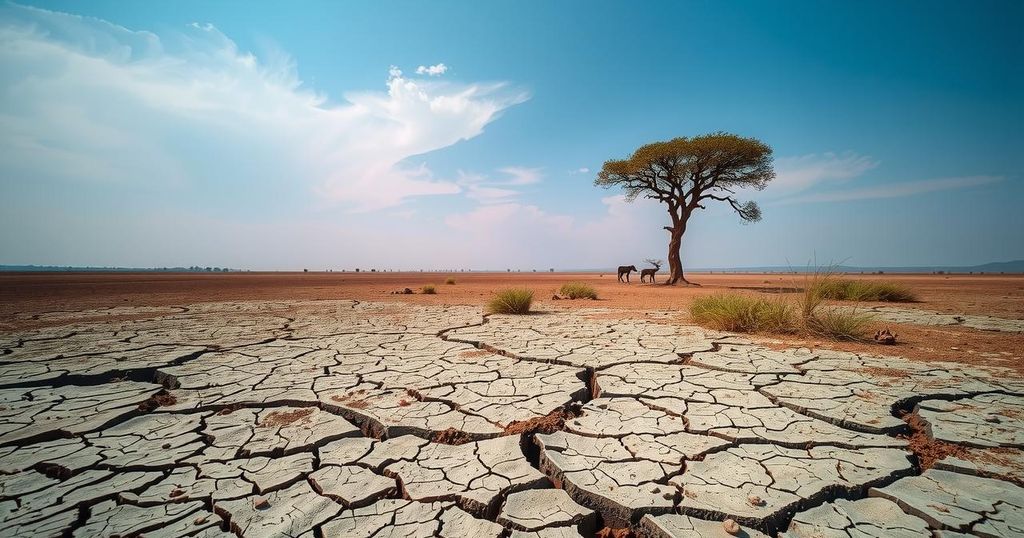Africa, despite contributing only 4% to global carbon emissions, faces the highest risks from climate change, necessitating significant adaptation funding that many nations lack. Economic challenges, political instability, and governance failures compound these crises, leading to widespread unrest among the youth. To combat climate change effectively, Africa needs internal reforms, enhanced governance, and substantial international financial support.
Africa faces a disproportionate burden of climate change despite contributing minimally to the global crisis. With only 4 percent of worldwide carbon emissions, the continent is expected to suffer the most severe consequences of climate change, which undermines its development efforts. The United Nations warns that African nations, particularly in Sub-Saharan Africa, are among the most vulnerable to the impacts of climate change. Adaptation to these changes requires substantial financial investment, estimated between $30 and $50 billion annually, amounts that many countries cannot afford.
Even nations capable of adapting encounter significant challenges, such as low productivity, high debt, and a growing young population that lacks employment opportunities. In 2024, Bola Ahmed Tinubu, President of Nigeria, emphasized the difficulty of balancing development goals with climate action, particularly the ambitious goal of achieving net-zero emissions by 2030. The continent’s population, currently 1.5 billion, is projected to double by 2070, intensifying the existing challenges as Africa receives only 4 percent of global foreign investment, amounting to $53 billion.
The irony is striking; despite being rich in natural resources, Africa is most affected by climate changes caused by industrialized nations. Historical growth in industrialized countries occurred with little regard for environmental sustainability, highlighting a controversial aspect of economic development that Africa now confronts. Climate change already impacts Africa’s economy with droughts, floods, and heatwaves, costing 2-5 percent of the GDP annually. The UN considers 17 of the 20 most vulnerable countries to be located in Africa.
The situation is exacerbated by socio-political unrest, particularly among the youth. Protests related to governance and economic conditions erupted in 2024, with young people demanding accountability and better leadership across various countries, including Nigeria and Kenya. As Sir Mo Ibrahim aptly notes, “Unmet expectations, especially for young people, fuel frustration and anger—the best triggers for unrest and conflicts.” These protests underline a disconnect between Africa’s potential and its current challenges.
To build resilience against climate change, Africa requires substantial economic growth, strong governance, and the establishment of opportunities. However, internal political dysfunction, characterized by corruption and poor governance, hampers adaptation efforts. Many leaders prioritize short-term political gains over environmental planning, resulting in insufficient mobilization of resources.
Despite pledges from developed nations to contribute $100 billion annually for climate action, this commitment was fulfilled only recently, and it still falls short of Africa’s needs. From 2019 to 2020, African nations averaged just $29.5 billion in climate finance, with a mere $11.4 billion allocated for adaptation efforts, highlighting a stark financing gap. Africa’s climate financing needs are estimated at $580 billion between 2020 and 2030, necessitating urgent action from wealthier nations to meet these needs.
Moreover, corruption remains a considerable drain on resources, costing the continent over $148 billion annually, thereby undermining climate resilience efforts. The African Union calls for enhanced governance and transparency to improve resource allocation and management of climate projects.
To combat climate change effectively, Africa must not only seek climate justice but also reform its governance systems to ensure effective resource utilization. Prioritizing climate-smart agriculture and investing in renewable energy sources will be crucial in alleviating dependency on fossil fuels and enhancing food security. Without confronting internal weaknesses, Africa risks becoming a permanent victim of a crisis resulting from others’ actions, undermining its potential to confront challenges it did not create.
The climate crisis represents a stark challenge for African nations, which contribute minimally to global carbon emissions while facing its devastating effects. Despite being rich in natural resources, Africa finds itself at the frontlines of climate change consequences, requiring significant financial investments for adaptation. Critical socio-political issues, including governance failures and socio-economic unrest, further complicate this landscape, demanding urgent action both internally and from the global community.
In conclusion, Africa’s struggle against climate change, exacerbated by historical inequities and current governance issues, necessitates both immediate and long-term solutions. Effective adaptation to climate consequences requires substantial financial support and internal reforms aimed at enhancing governance and accountability. As Africa seeks to combat the climate crisis, it must also ensure that its leadership prioritizes long-term sustainability over short-term gains.
Original Source: businessday.ng




